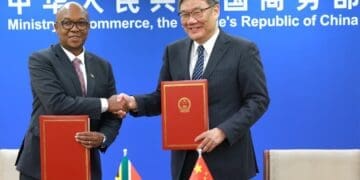South Africa has issued more than 1,100 hemp permits, yet only about 30% of permit holders are actively planting the crop, a sign of the deepening challenges facing the emerging industry.
Farmers and industry experts say the low participation rate is linked to several serious obstacles, including difficulty accessing certified seed, exclusion from financial support, and a shortage of processing facilities near farming communities.
“Many of us have the permits, but planting is not realistic without seed and proper markets. Even if you manage to grow hemp, you don’t know if there will be someone to buy it,” said farmer and permit holder Siphiwe Silinda.
Another major obstacle is the long distance between growers and existing processors or buyers. While some outlets offer off-take agreements, many are located far from production areas, forcing farmers to absorb high transport costs. Some agreements also shift financial risks onto farmers, making them hesitant to commit to large-scale planting.
Farmers argue that the industry can only grow if the gap between production and processing is closed.
In response, the Mpumalanga Green Cluster Agency (MGCA) hosted an industrial hemp event aimed at finding solutions to these bottlenecks. The gathering brought together farmers, processors, entrepreneurs, and policymakers to explore ways to make the hemp value chain more accessible and farmer-friendly.
Agricultural economist Siphe Zantsi from the Agricultural Research Council (ARC) alluded to the slow progress afflicting the sector.
“I heard about the hemp permit extension from three to five years, which is a good step. But we are not moving at the same speed as government departments. Hemp is not well known, and now farmers have to take calculated risks, which is one of the main challenges they face,” he said.
Stakeholders stressed the need for more local processing hubs and transparent contractual agreements that provide farmers with price certainty. The MGCA also urged financiers and government departments to extend support to small-scale farmers, warning that without access to funding and markets, hemp would remain a “paper crop” with little impact on livelihoods.
Farmers welcomed the initiative. Silinda, who runs Mapopo Creation Pty Ltd in Mpumalanga, said the conversation is a step in the right direction.
“It gives us hope to see agencies paying attention to our challenges, but these ideas must turn into action. We need buyers closer to us and agreements that don’t put all the risk on the farmer,” she said.
Despite the hurdles, stakeholders believe hemp remains a promising opportunity. Its versatility, from textiles and building materials to wellness products, makes it attractive for both local use and export. But for now, much of that potential remains untapped.
Industry observers say South Africa should look to countries like Canada and China, where integrated hemp value chains have been established through strong partnerships between farmers, processors, and buyers. Learning from these models, they argue, could help unlock the industry’s full potential.
Jannifer@vutivibusiness.co.za

































































